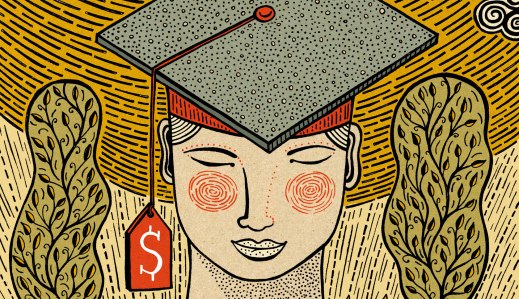To elevate the condition of the people
A really interesting take on the role student loans play in oppressing the American people.
Putting the Student Loan Crisis into Perspective
Reports from earlier this year suggest that the student loan crisis is not quite as volatile as some sensationalist media would have you believe. More specifically, the so-called “bubble” that increasing student debt has formed is only approximately 10% the volume of the mortgage bubble that causes the economic collapse in 2007/2008. While on a larger scale, we can breathe more easily knowing that our abundance of student loan debt is unlikely to throw us into another recession, we cannot forget the economic implications the student loan bubble has on a more individual basis. That is to say, just because the conglomeration of loans will not crash the entire economy, that does not mean that there are no other large-scale implications. With less pocket money and savings, people with loans cannot contribute to the economy through retail, luxury purchases and travel. Fewer people are buying cars and homes and going on vacation. The high levels of student loan debt hurts individual industries, which may not crash the economy, but they will certainly stunt its growth.
Read more here: http://www.forbes.com/sites/johntharvey/2014/04/28/student-loan-debt-crisis/
Millenials and Loans
I’ll be the first to say it: “Millenials” as we have come to call the teenagers and twenty-somethings of the 2000s, take a lot of flack for being lazy and inconsiderate, which makes cartoons like this all the more poignant. Times are different; the rising costs of education and the increasing necessity of a college degree have changed the game completely, and the result is that students are plummeted into debt, and seemingly punished for attempting to better themselves. We live in a society where professional growth is almost impossible without a degree, but of course, not everyone can afford a degree without financial assistance. Commence loans and debt. So for the parents who are frustrated with their recent (or not so recent) graduates and their looming debt, breathe and remember that maybe you didn’t act the same way, but that your circumstances weren’t exactly the same either. Of course, every situation is different, but it is not unlikely that your child is feeling just as overwhelmed as you are.
Is a Student Loan Actually Worth It?
When considering applying (or accepting the offer of) student loans, one of the most important things to weigh is the benefit of your college education against the inevitable stress and difficulty you will have to endure when the time comes to repay the loans. So, is it actually worth it? When should you choose to take a loan?
Once you accept a loan, the only thing you can do to remove the burden of repaying it is to – wait for it- repay the loan. Declaring bankruptcy will not get you out of repaying in the majority of cases, and interest will only keep building up until it is paid off in full. That said, there are still benefits to taking these loans if you, or your family are in a position to repay them in a timely manner.
However, new statistics are grim. Close to 40% of families where the head of the household is under 40 years old have some remaining student debt. Remember, these loans often stem from a time where education was less expensive and that they are still so difficult to pay off speaks volumes to how much more difficult it will continue to become with the rising cost of education. In addition to student debt, it is crucial to remember that you will incur many other debts, especially when you are still young. Student loans may put you in a difficult position when considering that you also need to pay housing and often transportation costs.
Check out this article for more of the latest statistics on student loans! http://wallstcheatsheet.com/personal-finance/is-it-worth-it-4-stats-about-student-borrowers.html/3/
And of course, if you already have student loans, and would like more information about consolidating them to make them easier to repay, check out our website at www.collegiateloanrelief.com
This week in student loans.
There was a media frenzy surrounding student loans this week, with Elizabeth Warren’s bill to enable Americans with student loans to refinance them to remove some of the financial burden in favor or raising taxes for the wealthy. This bill put the senate to the test: would they vote for students’ rights, or for the rights of the wealthy?
Over 40,000 Americans have some student debt, and the average total hovers around $30,000 in student loans that need to be repaid. In this economy with the current job market, paying off these loans is no easy feat. Had this bill passed, it would have offered some reprieve to college graduates struggling to repay their loans. But it did not.
Those who opposed the bill argued that it would not be an effective way to curb the issues surrounding the rising costs of education, and that it is more important to deal with current and future students’ needs than those of students who have graduated with existing debt. However, treasury experts and financial firms agree that steps must be taken to relieve some of this student debt before it takes a noticeable toll on the housing and auto markets.
Read more: http://www.huffingtonpost.com/2014/06/11/elizabeth-warren-student-loan-refinance_n_5484662.html
What are the Consequences of Defaulting?
· Borrowers who fail to make a payment on time are considered delinquent on their federal loan. Borrowers who do not make payments for 270 days are in default. Defaulting has severe and long‐lasting consequences, as follows.
· The Department of Education can immediately demand repayment of the total loan amount due.
· The Department of Education will attempt to collect the debt and may charge collection costs.
· The Department of Education reports defaulted loan to national credit bureaus, damaging borrowers’ credit ratings and making it difficult for borrowers to make purchases, such as cars or homes.
· Borrowers with loans in default are ineligible for Title IV student aid.
· Borrowers with loans in default are ineligible for deferments.
· The Internal Revenue Service can withhold borrowers’ Federal income tax refunds.
· Borrowers’ wages may be garnished up to 25%.
Student Loan Forgiveness

People who are now in their 30s are right in the middle of the two most-educated generations the United States has ever produced. And by “educated,” I mean attended college or a university. So, even though there are people in their 30s on both sides of the Gen X/Gen Y divide, college is (the?) one thing that unites the 18 – 49 demographic in this country. (Interestingly, 18- to 49-year-olds are also the target “demo” for TV advertisers.)
It makes sense that many of these people face a common struggle: Paying back their student loans. The federal student loan program has been around since the oldest Gen Xers were in diapers, so for almost every U.S. citizen seeking a college education since the mid 1960s, low-interest loans have been available from the federal government.
A series of Congressional actions over the years have made…
View original post 404 more words
Loan Consolidation 101: Tips For New Graduates
Great tips for new grads in dealing with their student loans!
What Happens When You Leave School?
http://www.direct.ed.gov/leaving.html
Generally speaking, students with federal student loans know what happens when they are getting ready to graduate. But what happens if you need to take a leave of absence, or if you are taking a course load that does not qualify you as a full time student?
In these cases, you are granted a 6 month period in which you do not have to make payments on your Direct Subsidized and Unsubsidized loans. After this time, you’ll be required to begin your payments. If you had an in-school deferment and you then leave school for one of the aforementioned reasons, you would be expected to begin making your payments immediately, or risk defaulting or losing your repayment incentives. However, if you return to school before half of you 6 month grace period has ended, you will be granted another when you leave again.
Direct PLUS loans do not come with a grace period; payments are expected to begin the day after you receive your last loan disbursement, but if you are a graduate or professional student, there are certain ways to receive an extension.
Remember, when in doubt, be sure to stay in touch with your loan servicer and ask all the questions you need. For more specific information, read the article posted above.
Best of luck,
CLR



Recent Comments